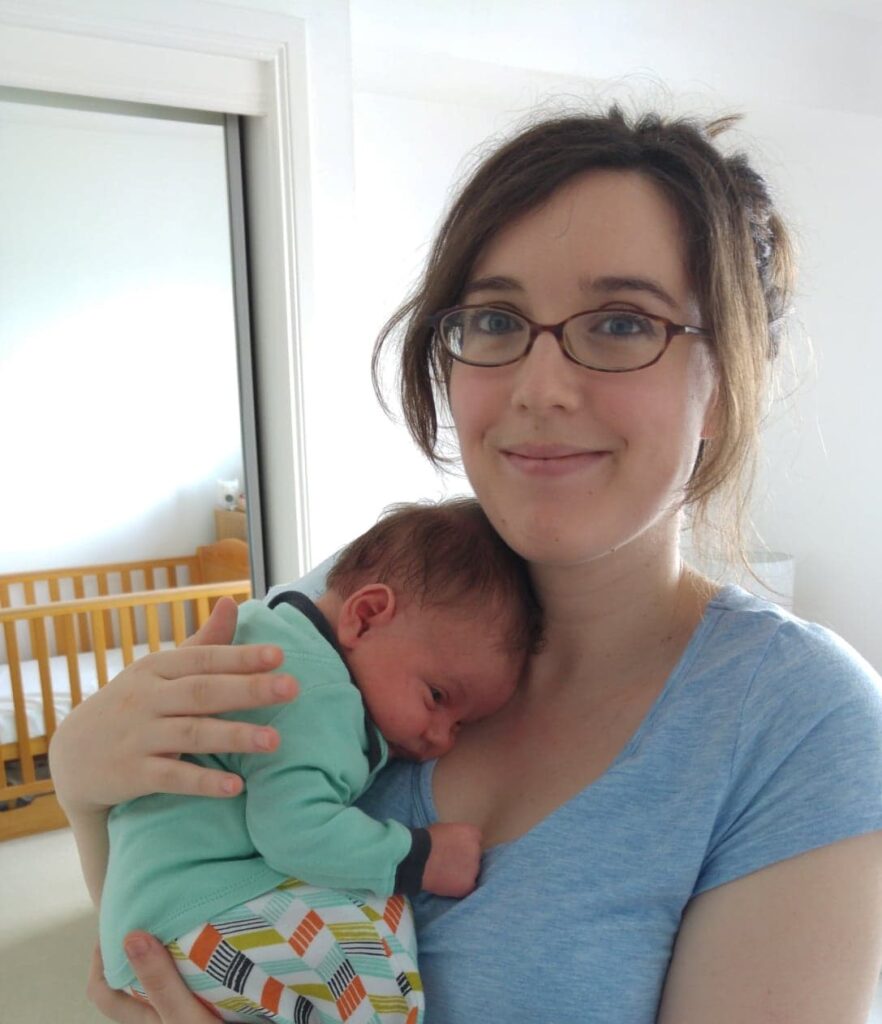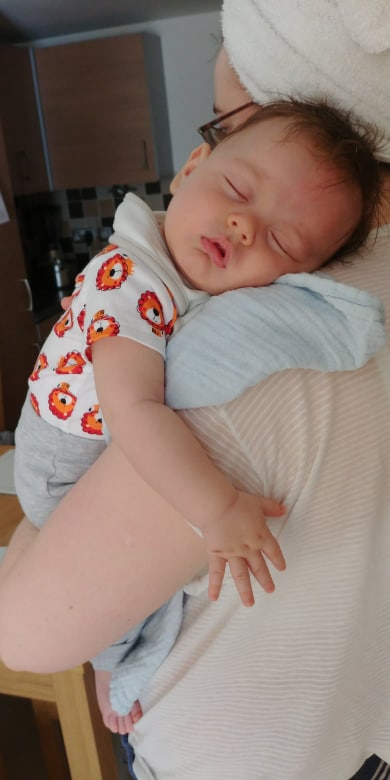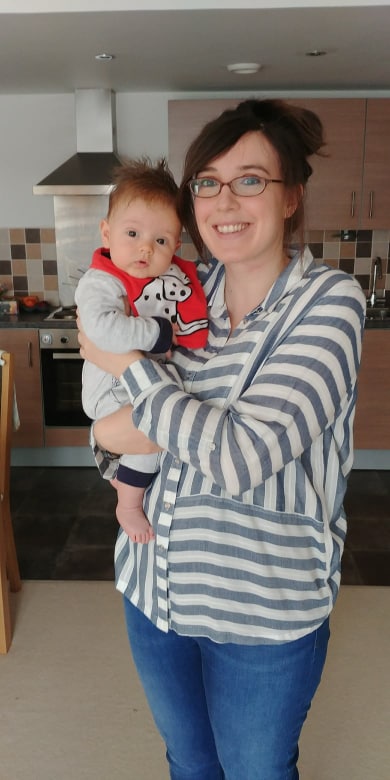Guest blog by Karen McMillian (@mother_truths).
I understood that sleep deprivation would be part and parcel of new motherhood. But I hadn’t accounted for it featuring quite so heavily and for quite so long. I didn’t anticipate that sleep (or the lack of) would come to define my experience of motherhood. I had no idea that it would make me feel such a disconnect from a world that seemed insistent on sleep training; on showing baby that you “mean business”. Because I didn’t mean business. This was my child and a relationship, not a contract I had entered into it.
My son Casey woke every two hours until the age of two, sometimes hourly if he was unwell or teething. Like many infants he was breastfed to sleep, often taking hours to fall asleep, only to wake 45 minutes later, and two hourly thereafter. He wouldn’t transfer to his cot for naps until he was ten months old.

The characteristically wakeful fourth trimester seemed to spill out into the 5th, 6th, or more like 10th for us. Casey felt like an eternal newborn whose very immediate need for me never let up. I would stupidly get my hopes up at various junctures. Convincing myself that he’ll sleep better after three months, after six months, after twelve months. No, once this leap passes, that’ll be it. No, once he’s walking, it’s got to be that. All the milestones would pass and the wake-ups would increase if anything. I felt like we’d been forgotten about, as everyone around me began to enjoy longer chunks of sleep.
Life felt like some sort of endurance test that I was losing. The tiredness accumulated over months and years so that it just became part of me. I could be such a good mum, I would think to myself if I could just find my way out of this sleep-deprived fog. Now, at two and a half, he generally wakes three times a night; cause for celebration in our house, a terrifying prospect for others.
Feeling the pressure
Motherhood is inescapably exhausting but the mainstream narrative surrounding infant sleep is making it more difficult for so many mothers. Everything I read seemed to point the finger at all the so-called bad habits I’d created by responding to his needs and suggested that the only way forward was to sleep train, something that just didn’t feel right for me. All the advice on mainstream apps, websites, hospital pamphlets kept saying that babies need help to learn how to sleep through. Why was I so unable to “teach” my baby to sleep? Conversations with Drs, health visitors and pharmacists all ended with bemused looks that I’d not attempted to sleep train yet “like everyone else”. I felt like me and my baby were broken and that I was slowly going mad.
I am lucky in that my family were and are incredibly supportive of my approach to Casey’s sleep. But in spite of that, I still felt pressure because as a first-time mum when the “experts” are telling you that you need to sleep train you automatically assume they are in the know and therefore must be right. Something about first-time motherhood renders you terrified of creating bad habits. A feeling that if I concede to this now, he will do this forever.
I felt increasingly isolated from the mums I met in real life who seemed sympathetic but surprised by how wakeful Casey was. They just kept saying their babies slept 7pm until 7am and didn’t need feeding or rocking to sleep. I became convinced that I was doing something wrong. Some would flippantly remark that I’m not doing him or myself any favours and that CIO is fine after a few nights. I would smile and nod politely.

A woman possessed
When you’re not getting any sleep, it soon becomes the only thing you think about. All consuming. The constant search for a reason why. A feeling that you must be missing a trick. It was exhausting. Almost as much as the actual wakeups. So convinced was I that his sleep was abnormal, that there must be some medical explanation, we had appointments with ENT departments for suspected sleep apnoea. But there was nothing. Because he wasn’t “struggling” with his sleep. I was. He wasn’t a code to crack, a problem to solve. He’s not what needed fixing. It was me that was broken or rather the unrealistic expectations that I held. So very broken.
Finding my tribe
One night, when I hit my lowest ebb about 6 months in, I posted on a local breastfeeding facebook group desperate for advice. A lovely lady pointed me in the direction of the Care it out Sleep Community; a facebook group founded by Kerry Secker, a safe space for sleep-deprived mums choosing a gentle path. I suddenly felt normal. Thousands of tired parents all in the same boat. This transformed how I perceived infant sleep from then on.
Changing the narrative
Slowly but surely the narrative around infant sleep is changing, particularly online. It is being seen less as something to correct and more as something to adapt to and accept as a tough but temporary season that will pass.
I am passionate about the option to not sleep train being as widely spoken about as the option to. But with a more balanced narrative comes criticism. Accusations of mum-shaming from those who have chosen to sleep train. It’s such a contentious issue. But I will be forever grateful for the articles I stumbled upon wherein frequent waking and breastfeeding to sleep was completely normalised. Because mums need to know that it’s ok to follow our instincts without fearing that we’re making matters worse, creating rods, or being a pushover.
I would love to see a future where the act of responding to our babies night time needs for years on end is not seen as a rebellious counter-cultural act but rather a celebrated and empowered everyday choice that is normalised by healthcare professionals in antenatal classes, in health visitor appointments, in hospital pamphlets and on mainstream parenting websites.

Survival tactics
- Stop blaming yourself. This is normal. Your baby is normal and you’re doing a fantastic job of responding to their needs.
- Surround yourself with the right noise. Delete the apps and bin the books that make you feel rubbish. There’s a whole community out there passionate about normalising infant sleep. Those that helped me were Pinky McKay, Grubby Mummy, The Beyond Sleep Training Project, Sarah Ockwell Smith, Raising Ziggy, Mrs Mombastic. You’ll soon begin to feel normal again.
- Realign expectations. I came to accept that two hourly chunks of sleep were my reality. I tried to reframe it. I would think to myself that a two-hour nap in the day would be a treat, so began to think of nighttime as being three really good naps, enough to see me through.
- Go to bed at 7pm a few nights a week when baby does. Look upon it as a reverse lie-in.
- Stop counting the wakeups. I’m pretty bad at this.
- Embrace safe co-sleeping if it suits you.
- Seek out, other sleep-deprived mums. They have the same tired, faraway look in their eyes as though they are daydreaming of bed. I also found a sleep-deprived online buddy. We would message every week. Just a simple “how was your night” with no judgement, no suggested solutions, just empathy and understanding.
- Lower your expectations. Don’t feel guilty if you’re not doing all the things or enjoying it as much as you think you should or perceive other mums to be. The phrase “Happy Mum, Happy Baby” used to make me feel awful. Because I was so tired and if I’m honest quite unhappy a lot of the time (mainly because I felt I was failing due to his wakefulness). But in spite of that, Casey was and is a happy and thriving child and I honestly attribute that in part to my nighttime responsiveness.
